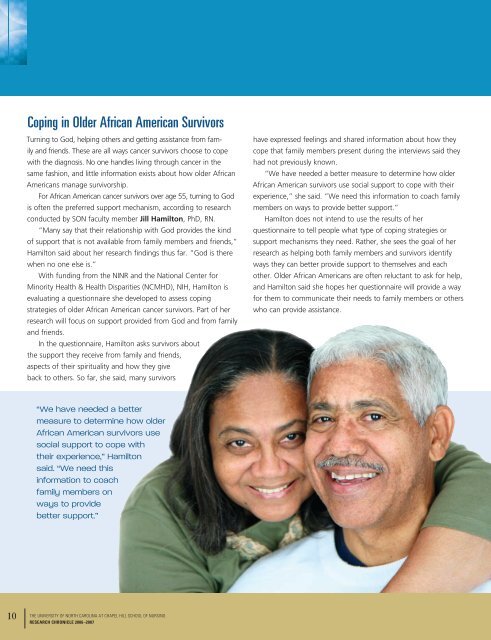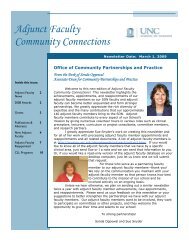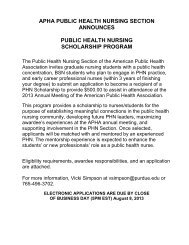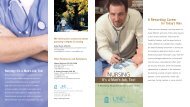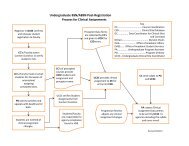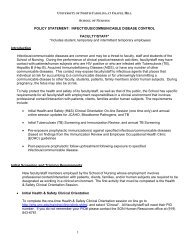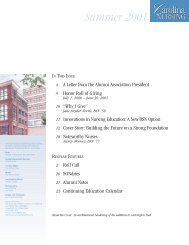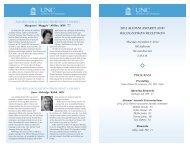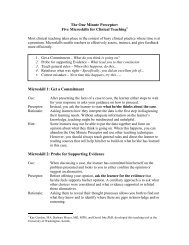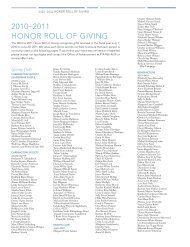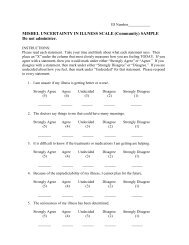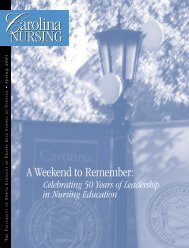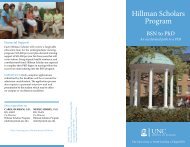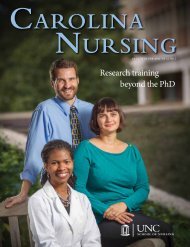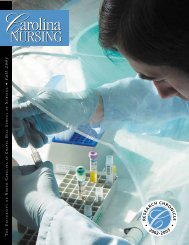Research Chronicle, 2006 - School of Nursing - University of North ...
Research Chronicle, 2006 - School of Nursing - University of North ...
Research Chronicle, 2006 - School of Nursing - University of North ...
Create successful ePaper yourself
Turn your PDF publications into a flip-book with our unique Google optimized e-Paper software.
10<br />
Coping in Older African American Survivors<br />
Turning to God, helping others and getting assistance from family<br />
and friends. These are all ways cancer survivors choose to cope<br />
with the diagnosis. No one handles living through cancer in the<br />
same fashion, and little information exists about how older African<br />
Americans manage survivorship.<br />
For African American cancer survivors over age 55, turning to God<br />
is <strong>of</strong>ten the preferred support mechanism, according to research<br />
conducted by SON faculty member Jill Hamilton, PhD, RN.<br />
“Many say that their relationship with God provides the kind<br />
<strong>of</strong> support that is not available from family members and friends,”<br />
Hamilton said about her research findings thus far. “God is there<br />
when no one else is.”<br />
With funding from the NINR and the National Center for<br />
Minority Health & Health Disparities (NCMHD), NIH, Hamilton is<br />
evaluating a questionnaire she developed to assess coping<br />
strategies <strong>of</strong> older African American cancer survivors. Part <strong>of</strong> her<br />
research will focus on support provided from God and from family<br />
and friends.<br />
In the questionnaire, Hamilton asks survivors about<br />
the support they receive from family and friends,<br />
aspects <strong>of</strong> their spirituality and how they give<br />
back to others. So far, she said, many survivors<br />
“We have needed a better<br />
measure to determine how older<br />
African American survivors use<br />
social support to cope with<br />
their experience,” Hamilton<br />
said. “We need this<br />
information to coach<br />
family members on<br />
ways to provide<br />
better support.”<br />
THE UNIVERSITY OF NORTH CAROLINA AT CHAPEL HILL SCHOOL OF NURSING<br />
RESEARCH CHRONICLE <strong>2006</strong>–2007<br />
have expressed feelings and shared information about how they<br />
cope that family members present during the interviews said they<br />
had not previously known.<br />
“We have needed a better measure to determine how older<br />
African American survivors use social support to cope with their<br />
experience,” she said. “We need this information to coach family<br />
members on ways to provide better support.”<br />
Hamilton does not intend to use the results <strong>of</strong> her<br />
questionnaire to tell people what type <strong>of</strong> coping strategies or<br />
support mechanisms they need. Rather, she sees the goal <strong>of</strong> her<br />
research as helping both family members and survivors identify<br />
ways they can better provide support to themselves and each<br />
other. Older African Americans are <strong>of</strong>ten reluctant to ask for help,<br />
and Hamilton said she hopes her questionnaire will provide a way<br />
for them to communicate their needs to family members or others<br />
who can provide assistance.


